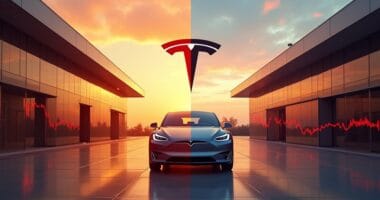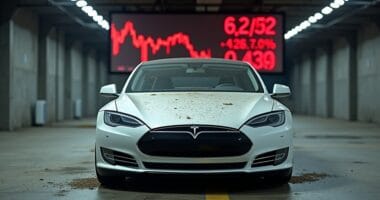Tesla’s dramatic 50% sales decline in Europe during April 2025 has shocked industry observers, especially since the broader EV market grew by 34%. The former market leader managed to sell only 7,261 vehicles, while competitors like BYD surged ahead. Elon Musk’s controversial statements and outdated vehicle lineup haven’t helped matters. With Tesla’s market share plunging from 1.3% to 0.6%, this unprecedented reversal suggests deeper issues beneath the surface.

Tesla’s grip on Europe’s electric vehicle market is crumbling. The once-dominant EV maker watched its sales plummet by an astounding 50% in April 2025, managing to move just 7,261 vehicles compared to 14,228 in the same month last year. Talk about a nosedive.
Tesla’s European empire is falling apart as sales crash 50% in April 2025, marking a stunning decline for the former EV king.
The numbers paint a brutal picture. Tesla’s market share in new car registrations has shriveled to a measly 0.6%, down from 1.3% a year ago. And it’s not just a one-month fluke – their year-to-date sales have tanked by 46%. New car registrations in major markets like the UK, Norway, and Switzerland show similar declines. Ouch.
What’s particularly awkward for Tesla is that this collapse comes during a boom time for EVs in Europe. While they’re struggling, overall battery-electric vehicle registrations jumped by 34% in April. Even more embarrassing? Chinese manufacturer BYD just outsold them for the first time in European history.
The reasons behind Tesla’s European nightmare are piling up faster than charging stations. Protests against Elon Musk’s controversial statements haven’t helped, with angry crowds gathering at dealerships. The company’s recent collaboration with Trump’s Department of Government Efficiency has sparked widespread backlash.
European competitors are churning out fresh models while Tesla’s lineup is starting to look about as current as last year’s smartphone. Brand perception has taken a beating too, largely thanks to Musk’s various headline-grabbing side projects.
Meanwhile, European automakers are stepping up their game, introducing innovative features that make Tesla’s offerings seem increasingly ordinary. Local brands are gaining ground, backed by regulations that favor European manufacturers.
The financial markets have noticed. Tesla’s stock has dropped 16% year-to-date, reflecting investor concerns about the company’s European performance. Investors are reconsidering their risk and return expectations as the company faces mounting challenges. The company’s pricing strategies are under scrutiny, especially as production costs rise and supply chain headaches persist.
For a company that once dominated the EV conversation, Tesla’s current situation in Europe is nothing short of a dramatic reversal. While the broader European EV market continues its upward trajectory, Tesla’s finding itself in an unfamiliar position – watching others zoom past in the fast lane.





